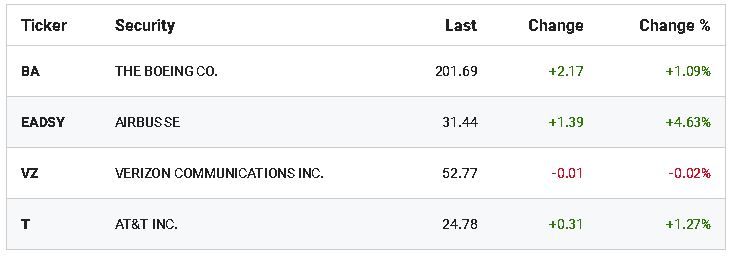The letter warns 5G C-band transmissions could interfere with radio altimeters, which provide critical altitude for pilots when operating in low visibility environments
The executives of Boeing and Airbus have penned a letter to Transportation Secretary Pete Buttigieg urging the Biden administration to postpone the rollout of 5G service from AT&T and Verizon on Jan. 5.

In the letter shared by Reuters, Airbus CEO Jeff Knittel and Boeing CEO David Calhoun express concern that potential interference from 5G C-band transmissions could impact radio altimeters on aircraft, which provide critical altitude information for pilots when operating in low visibility environments. The telecommunications companies agreed in November to delay the 5G rollout by a month to address those concerns, according to the Wall Street Journal.
The Federal Aviation Administration issued an airworthiness directive earlier this month, which warns that 5G interference has the potential to "significantly degrade radio altimeter functions during critical phases of flight" and result in flight diversions. As a result, the agency is restricting pilots use of automatic landing systems and other flight systems at low altitudes where they can be negatively impacted by 5G wireless signals and will provide additional guidance before Jan. 5.
"The aerospace industry is focused on fully evaluating and addressing the potential for 5G interference with radio altimeters," A Boeing spokesperson told FOX Business. "We are collaborating with aviation authorities, government leaders, airlines, and industry groups to ensure the continued operational safety of aircraft throughout the aviation system worldwide."
In addition to the letter, Boeing and Airbus have proposed a limit on 5G transmissions around airports and where radio altimeters are critical to aircraft safety, which the executives say would mitigate potential interference and eliminate the need for the FAA's operational restrictions. The Department of Transportation declined to comment.
An economic analysis from Airlines for America estimates the 5G C-band transmissions could result in delays, diversions or cancellations for 345,000 passenger flights, 32 million passengers and 5,400 cargo flights, $2.1 billion in annual operating costs annually for U.S. airlines and A4A cargo operators and $1.59 billion in lost wages and productivity annually for passengers and shippers.
However, wireless industry group CTIA argues that nearly 40 countries are already safely using 5G C-band transmissions.
"All available evidence—including existing 5G networks that use this spectrum in countries around the world and actual flight testing that was conducted on this very issue—show that 5G networks using these radio waves do not interfere with aviation equipment," an FAQ on its website states. "There is a limited amount of mid-band spectrum available to power 5G networks, and C-band spectrum is one of the few options available in the United States. Delaying access to this spectrum has real impacts: every six-month delay in 5G deployment costs our nation’s economy $25 billion in economic benefits over the next decade, risks America’s competitiveness, and jeopardizes our ability to ensure global 5G leadership."
Following productive discussions, the CTIA, Aeropsace Industries Association and Airlines for America said in a joint statement on Wednesday that the 5G rollout remains on track for Jan. 5.
"We will be working together to share the available data from all parties to identify the specific areas of concern for aviation. The best technical experts from across both industries will be working collectively to identify a path forward, in coordination with the FAA and FCC," the statement reads. "Our belief is that by working collaboratively in good faith on a data-driven solution, we can achieve our shared goal of deploying 5G while preserving aviation safety."
The FAA told FOX Business it is "encouraged that avionics manufacturers and wireless companies are taking steps to test how dozens of radio altimeters will perform in the high-powered 5G environment envisioned for the United States" and that it will work with manufacturers and operators to make sure testing provides "adequate safety margins and accounts for the variety of safety systems that rely on accurate information from radio altimeters."
The FCC added it continues to work productively with the FAA to ensure the safe and swift deployment of new technologies and remain optimistic that outstanding issues related to the 5G launch will be resolved.















